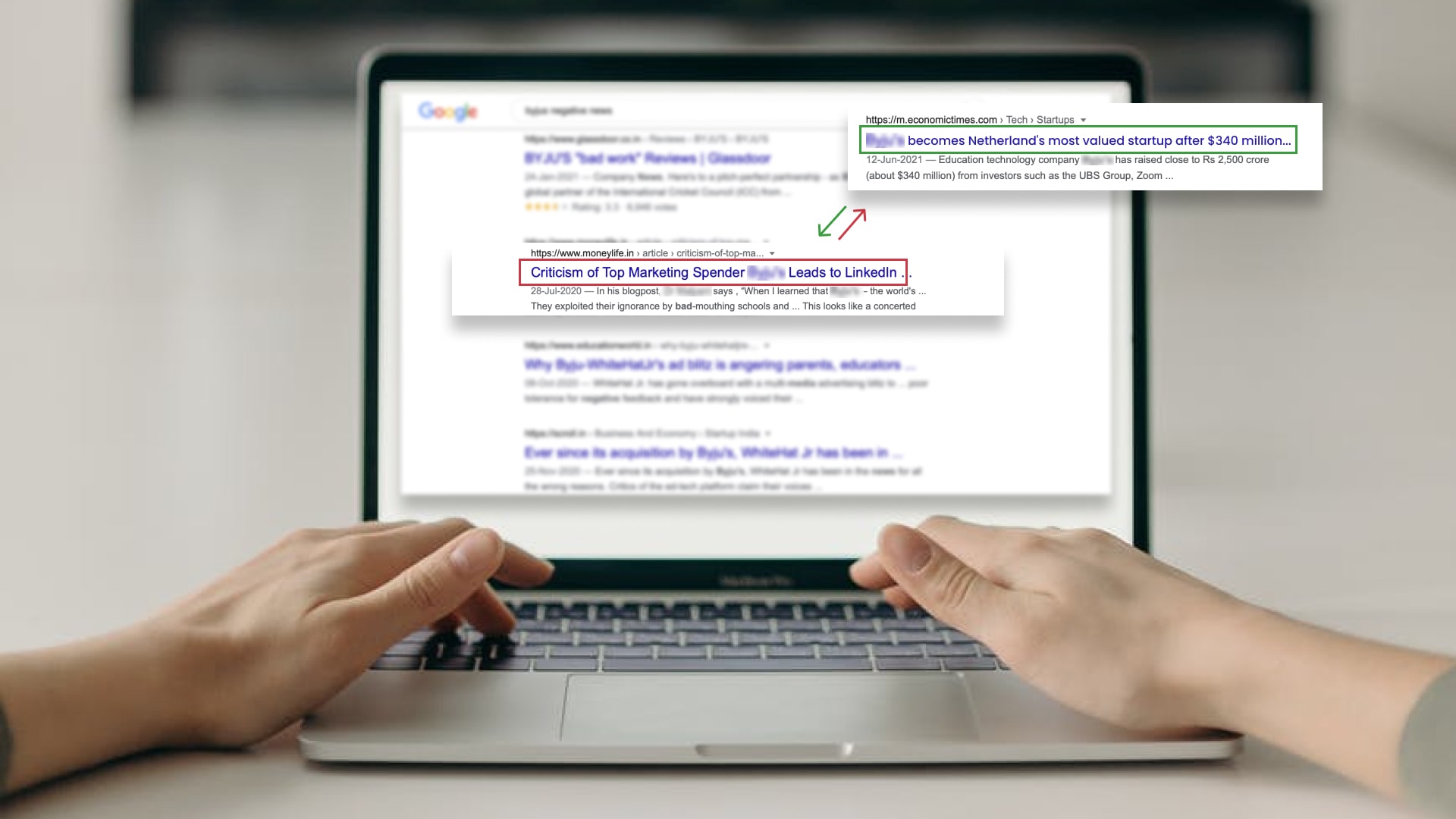What are the consequences of having an online reputation that is in disrepute? One bad post can cost you more than you can imagine. In the cache of information that is constantly updated online, anything that is posted – whether it is positive or negative – can easily lead back to you. Unwanted negative content from Google search engine result pages can:
- Negatively influence your public image.
- Disesteem an individual personally or professionally.
- Create doubt about the overall quality of your products or services and your ability to deliver value.
In fact, over 80% of potential customers report that they research a company’s online reputation before making a purchase decision, highlighting the significant impact that negative content can have on consumer trust. All these effects have the potential to adversely affect revenue streams or hurt your career. That is why removing online content that compromises your reputation should be a priority as soon as it is identified.
Why Is Negative Content on the Internet So Popular?
Search engines implement algorithms that give people the answer to their queries, but it’s only part of human nature to give more attention to negative details than to positive ones. In fact, when people are searching for general terms, search engines show them a broad set of results. However, people are more likely to click on the negative links rather than the positive ones, making the negative links rank higher. To remove negative information online, you need to consider some search engine algorithms.
As for Google and other search engines, they implement multiple algorithms to always satisfy the user intent. Two of the most important algorithms that Google applies are Query Deserves Diversity (QDD) and Query Deserves Freshness (QDF).
Query Deserves Diversity (QDD)
Query Deserves Diversity or QDD is an algorithm that helps Google answer searchers’ queries that are general or unclear. Therefore, when the searcher uses general terms or has ambiguous queries, Google displays a broad set of results to better answer the query. After that, Google gets feedback as to which results satisfied the user intent to help in the ranking process.
Query Deserves Freshness (QDF)
Query Deserves Freshness or QDF is an algorithm that helps Google provide up-to-date answers concerning topics that change over time. Therefore, Google monitors blogs and magazines, news portals, and search requests. So when there’s an increase in all the previous three, Google starts ranking new content that answers the queries about the changes that are happening in a specific topic.

Image Credits: Pexels
Remove Online Content
You can choose to totally remove negative content from Google search engine result pages or to suppress negative links from the internet.
Total content removal from the internet can be done using legal means, reaching out to website administrators, or contacting Google to take down the information.
Types of Online Content That Can Be Removed
The internet is filled with content that may not always reflect the truth, protect personal privacy, or respect intellectual property. Fortunately, there are several types of online content that can be removed or suppressed. Understanding what qualifies for removal can help individuals and businesses manage their online presence and protect their reputations. Below are the key types of content that are eligible for removal.
Personal Data and Privacy Violations
What it covers: Private info such as addresses, phone numbers, or photos posted without consent.
Examples: Your home address or photo shared online.
Why it can be removed: Privacy laws (e.g., GDPR) allow the removal of sensitive personal data.
Defamatory or Harmful Content
What it covers: False statements harming someone’s reputation.
Examples: A false accusation or harmful review.
Why it can be removed: Defamation laws allow the removal of content that causes serious harm, especially when proven false.
Misleading Reviews and Fake Testimonials
What it covers: Fraudulent or manipulated reviews.
Examples: Fake negative reviews or undisclosed sponsored posts.
Why it can be removed: Many platforms have policies to remove deceptive content.
Copyright Infringement
What it covers: Content posted without permission that violates copyright.
Examples: Photos or articles copied without consent.
Why it can be removed: DMCA takedown notices and similar laws protect intellectual property.
Outdated or Excessively Persistent Records
What it covers: Content that’s no longer relevant or accurate.
Examples: Old criminal records or outdated contact information.
Why it can be removed: Search engines allow the removal of outdated content.
We Value Reputation,
Let’s Rebuild Yours.
A Positive Reputation is Priceless. Value and Protect It.
Remove Content Legally from Google
Consult with legal experts in the field of internet defamation who can help you digitally expunge undesired content from the internet. Depending on the situation, the following tactics can be used;
- Obtaining a court order. A court order is effective as they are legally recognized, and if ignored, a publisher can face criminal charges.
- Issuing a cease and desist letter. A cease and desist letter is a legally issued order that demands the one is served with the notice stops any harmful or allegedly harmful activity. Cease and desist letters are effective in the case of defamatory or slanderous content. If the letter is not obeyed, then a lawsuit is the next step.
Ask for a DCMA takedown notice. If the content infringes on your copyright and violates Digital Millennium Copyright Act, then a legal notice called a DCMA takedown notice is sent from the copyright owner to the person who published the information, asking them to remove the copyright-protected content from the internet. This is usually the case if someone is using copyrighted material to defame you.

Image Credits: Freepik
Remove Negative Content by Contacting the Site Administrator
This involves directly removing the content from its source. These sites can provide information about who owns a site domain: domaintools, whatismyipaddress, infosniper. Once you have identified who owns the domain publishing offensive content, the following methods can be used:
Submitting an Editorial Request
Submitting an editorial request. Editorial requests are non-threatening. Once a line of communication has been opened, you can ask the publication to remove any identifying information, completely take down the post, or update the content to reflect current information if it is the case of ongoing court proceedings. This action can be carried out by an individual or through an attorney. Unlike cease and desist letters, there isn’t a consequence of legal action if the site administrator does not oblige to your request.
Ask for Not Indexing the Page
Ask the website to add a No Index tag which would make the URL link ‘invisible.’ This means that the post would not show up on search engine results pages. Remember, sometimes it’s easier to hide negative content than to remove it completely.
Removal Request From a Search Engine or Data Broker
You can submit a request for removal on Google in the case of personal information, revenge porn, financial or contact information shared for doxxing purposes. This type of content is considered in violation of Google’s terms of service. Google can also de-index the post on the website so that it does not show up on search engine results, therefore, cannot be linked. While the content hasn’t been totally removed, it slowly ‘disappears’ by ranking lower and lower on web page results for a user brand query.
Similarly, you can cite terms of service violations when flagging content for removal on popular social media sites.

Image Credits: Pexels
Suppressing Negative Content on the Internet
Suppression is a reverse SEO tactic in which one optimizes already existing or new positive content about their brand to bury negative content from the internet. In this way, a business or executive leverages on the best aspects of their product, service, career highlights to re-direct traffic away from an undesirable keyword. The aim is to have the information that reflects the best version of their brand showing up on the first two pages of search engine results.
Search Engine Algorithm and Content Removal
Search engines like Google and Bing use complex algorithms to decide which content appears in search results. These algorithms prioritize content based on relevance, authority, and user engagement. Understanding how search engines rank content can help you use SEO strategies to effectively remove or suppress outdated or negative content.
How Search Engines Rank Content
- Relevance: Search engines assess how closely a piece of content matches a user’s query. Factors like keywords, the context of content, and meta tags play a crucial role in determining relevance.
- Authority: Google and Bing measure a website’s authority based on links from other trusted sites (backlinks), domain age, and the overall quality of the content.
- User Engagement: Search engines consider how users interact with content. Pages that receive more clicks, longer dwell times, and positive feedback tend to rank higher.
Online Content Removal via Search Engines
Search engines like Google and Bing prioritize content based on several factors beyond relevance. By understanding how their algorithms work, you can leverage SEO strategies to help remove or suppress outdated or negative content.
Key Algorithm Factors
- User Engagement: Search engines track how users interact with content. Low engagement (e.g., high bounce rates) can signal to algorithms that content is less useful, which could lead to it dropping in rank.
- Content Freshness: New content tends to rank higher. By regularly updating or posting fresh, positive content, you can push older, negative material lower in search results.
- Structured Data: Using structured data (schema markup) helps search engines better understand your content, improving visibility and the chance to outrank negative content.
- SEO Signals: Optimizing meta descriptions, titles, and internal links can improve the visibility of positive content, helping it push down unwanted results.
Algorithm Updates and Reputation Management
Search engines update their algorithms frequently, which can shift rankings. Negative content that’s not well-optimized might be demoted in updates. By creating fresh, optimized content and gaining backlinks from authoritative sites, you can gradually suppress negative content in search results. Engaging with reputable platforms further strengthens your online presence.
Tools for Managing Search Results
- Google Search Console: Allows you to request the removal of outdated content, monitor crawl issues, and optimize your site for better search ranking.
- Bing Webmaster Tools: Provides similar functionality to Google’s tools, allowing removal of outdated content or specific URLs.
By understanding how search engines prioritize and rank content, you can strategically use SEO tactics to manage your online reputation and effectively push negative or outdated content out of search results.
How Can I Prevent Negative Content About My Brand From Appearing on the Internet?
Smart entrepreneurs will quickly discover that investing in online reputation management is no longer an option. There are a multitude of reasons why any business owner, lawyer, doctor or an individual may need to delete content–a bad review, unwanted personal information, or a false statement. To manage your brand reputation and be proactive about your digital presence you have to;
- Regularly perform simple reputation audits. This is done by opening the incognito window on your browser and searching your name. Take note of the results that come up. Do they reflect a true image of your brand?
- The second thing that you can do is to set up frequent Google alerts for your keyword. These alerts will help you monitor your online reputation by letting you know what is being said about your brand on the internet
- Amplify your digital presence by creating comprehensive profiles on relevant industry websites. Regularly post high-quality engaging content on social media profiles.
- Consistently monitor your reviews on Google My Business listings and other business review sites such as Yelp or Glassdoor. Develop a mechanism for populating your website with positive reviews and requesting for five star ratings from customers who have been satisfied by your products and services.
- Familiarise yourself with the best techniques to respond to negative reviews without coming off as aggressive or confrontational. Work on improving your business based on client feedback.
- Provide stellar customer service and high-quality products and services.
Reach out to high domain authority websites and request to collaborate. This can either be by publishing on their website or requesting for ‘do-follow’ links that strengthen your network of backlinks.

Image Credits: Unsplash
When to Consult an Online Reputation Management Firm?
It is possible to do all the work to remove negative content from the internet, but that can take away vital internal human resource away from important aspects of your business. What’s more is that it is possible to end up causing even more damage to an already bad situation. Why? Because of all the negative emotion that surrounds a situation where you are trying to delete negative information from the internet. It can be quite difficult to stay objective.
This is where the experts come in. An online reputation management firm is well-resourced to mitigate reputational risk and provide expert witnesses and attorneys who can quantify the financial loss of internet defamation. Internet defamation attorneys understand the intricacies of defamation law and have the capacity to provide legal advice on online harassment, extortion, copyright law, and other cases that can compromise your cyber security.
There are a plethora of boutique agencies operating different strategies for content removal. Typically a campaign involving business or individual online reputation management and repair runs for six to twelve months. It is a time-intensive process where rigorous SEO and public relation strategies are employed. Be wary of content removal agencies that offer 100% guarantees while promising results over a short period of time. The idea of a quick fix is definitely tempting, but your brand shall ending up paying dearly for a short-sighted strategy in the long run.
Lookout for unethical content removal strategies, such as creating fake accounts to post fake reviews or comments or proposals for bogus legal action.
Conclusion
Maintaining a positive online reputation is crucial in today’s interconnected world, where a single negative post can significantly impact personal and professional lives. The consequences of having a tarnished online presence can range from damage to one’s public image to potential financial losses and diminished career prospects. Given that negative content can quickly gain traction and rank high on search engine results, it is important to take action promptly if unwanted information appears.
Whether by legally removing content, contacting website administrators, or using SEO tactics to suppress damaging information, there are multiple approaches to managing online reputation. While some individuals or businesses may be able to handle reputation management on their own, others may benefit from consulting with professionals in the field, especially when the stakes are high.
To sum up the key steps for removing online content and improving online reputation, refer to the table below:
| Action | Description | Recommended For |
| Remove Content Legally | Consult legal experts to use court orders, cease and desist letters, or DMCA takedown notices. | Defamation cases, copyright issues |
| Contact Site Administrators | Reach out to the website or platform hosting the negative content for removal or updates. | When content is hosted on third-party sites |
| Use Search Engine Removal Requests | Submit removal requests for personal data, revenge content, or other violations of terms of service. | Personal information, doxxing |
| Suppress Negative Content (SEO) | Optimize positive content to rank higher, pushing negative content down in search results. | Businesses, professionals, public figures |
| Monitor Your Reputation Regularly | Conduct regular reputation audits and set up Google alerts for mentions of your name or brand. | Ongoing brand management |
| Work With an Online Reputation Firm | Hire professionals to mitigate reputational risks, especially if time or expertise is limited. | Businesses, individuals facing complex cases |
By actively managing and monitoring your online presence, you can protect your reputation and prevent any lasting damage. Whether you take a DIY approach or enlist the help of experts, timely and strategic actions are key to safeguarding your digital footprint.
Frequently Asked Questions
How to remove online presence?
Start by searching your name and listing every account, profile, and post you find. Delete or deactivate accounts where possible, remove profile photos, and set everything else to private. Opt out of data broker sites by using their removal forms, and ask websites that published your info to take it down under privacy or copyright rules where applicable.
Can you delete your online presence?
You can greatly reduce it, but you usually cannot erase it completely. Some sites keep backups, others need to keep certain records for legal or business reasons, and anything that was copied or shared by other people may remain.
How to get content removed from the internet?
Contact the site owner or platform and use their report or removal form, explaining why the content should come down, for example, privacy violation, defamation, or copyright. For search results use tools like the Google removal request forms. For serious issues such as revenge content, harassment, or leaked personal data, you may need help from a lawyer or local authorities.
Do You Need Help Removing Negative Online Content?
Our Team of Experts Will Be Happy to Guide You. We Are Just a Message Away.













Comments are closed.